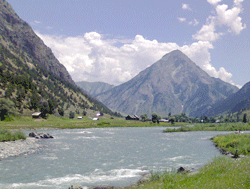
India on Monday claimed victory in one of its major disputes with Pakistan, as a court of arbitration based in The Hague gave its go-ahead to New Delhi to divert water from Kishenganga or Neelum river to build a hydro-electric project in Baramullah district of Jammu and Kashmir.
The official spokesperson of the Ministry of External Affairs, Syed Akbaruddin, said that the award of the Court of Arbitration at The Hague reaffirmed the validity of New Delhi’s position on the Kishenganga Hydro-Electric Project (KHEP) as it allowed diversion of water from Kishenganga as envisaged by India.
He, however, added that the details of the award were being studied. Invoking the 1960 India-Pakistan Indus Water Treaty, Islamabad had in 2010 sought arbitration by an international court on its dispute with New Delhi over the 330 MW Kishenganga Hydro Electric Project, which the National Hydro-Power Corporation Limited is building in Baramulla district of Jammu and Kashmir.
Islamabad had argued before the Court of Arbitration in The Hague that the KHEP would adversely hit power generation at the 969 MW Neelum Jhelum Hydro Electric Project, which it had been building downstream on the same river in the Pakistani side of the Line of Control. Claiming that Islamabad had “consistently failed to substantiate” its claim of downstream uses of the water of Kishenganga or Neelum, India had argued before the international Court of Arbitration that Pakistan had “failed to demonstrate its commitment to the realization” of the N-JHEP.
Pakistan, however, had claimed that it had remained committed to the project since 1989. The seven-member Court of Arbitration headed by eminent American jurist Stephen M Schwebel had finished hearing arguments of both Indian and Pakistani representatives on August 31 last and delivered the final award on Monday.
“It (the award of the Court of Arbitration) highlights once again that India is adhering to all the provisions of the Indus Waters Treaty (IWT),” said Akbaruddin.
New Delhi had argued that the IWT required India to take into account Pakistan’s downstream uses only up to a date at which designs of its own hydroelectric projects would be finalized. India had also pointed out that if it had to continuously adjust its hydel projects’ designs then the express right granted to it by the IWT to use waters of the “Western Rivers” to generate hydropower would stand negated. Pakistan had on the other hand claimed that the treaty protected its “downstream uses as they would exist from time-to-time”.
